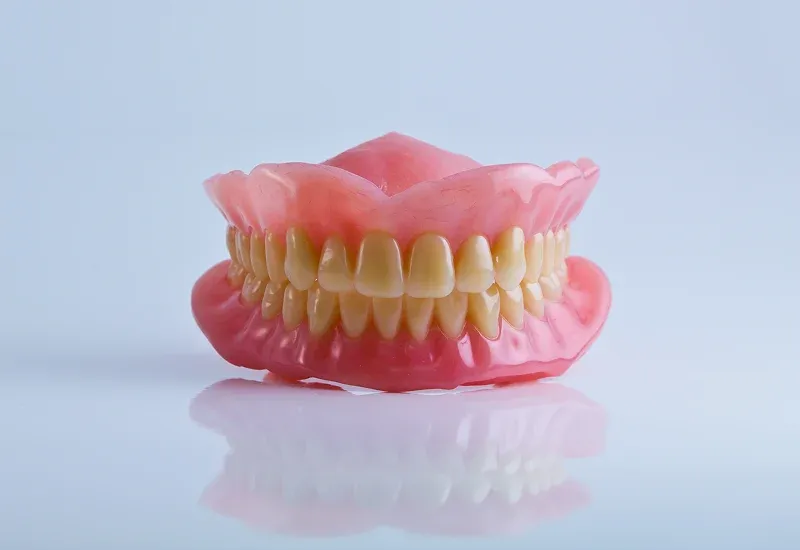Dealing with Loose Dentures: Causes and Solutions
by Dr. Azadeh Hosseini
17 September 2025

Dentures are designed to bring back your smile, restore chewing ability, and boost confidence after tooth loss. But over time, many people experience loose dentures, a frustrating issue that makes eating, speaking, and daily life harder than it should be. If you’ve found yourself wondering, “Why do my dentures feel loose?” or searching for ways on “how to tighten dentures,” you’re not alone. Denture slipping is one of the most common concerns patients bring to their dentist.
The good news? Loose dentures are not a permanent problem. Once you understand the causes of loose dentures and the available solutions, you’ll see there are multiple ways to restore comfort, stability, and peace of mind.

Home Remedies vs. Professional Adjustments
Many people try to manage loose dentures at home with over-the-counter denture adhesive. While adhesives can help temporarily, they are not a replacement for professional care. If you find yourself asking “Can a dentist adjust my dentures?” the answer is yes and only a dentist can provide long-term relief by relining, rebasing, or replacing your dentures.
Trying to self-adjust or repair dentures at home can lead to further damage or discomfort. Instead, think of adhesives as a short-term support and regular dental visits as the long-term solution.
Are Loose Dentures Normal
It’s common for patients to wonder, “Are loose dentures normal?” The answer is yes—dentures are expected to need adjustments over time. The mouth is dynamic, and natural changes in bone and soft tissue mean that even well-made dentures will loosen eventually. What matters most is addressing the problem early rather than tolerating discomfort.
Dentures rarely maintain their perfect fit forever because the mouth is constantly changing. One major cause is bone resorption, which occurs when natural teeth are lost and the jawbone no longer receives stimulation, leading to gradual shrinking and reduced support for dentures. Alongside this, oral tissue changes such as thinning, recession, or loss of elasticity in the gums can alter how dentures sit. Everyday wear and tear from chewing, speaking, and cleaning also contributes, as the denture materials themselves gradually wear down. In addition, medical and lifestyle factors like weight loss, medications that cause dry mouth, or conditions that affect bone density may increase denture instability. While these changes are normal, they can leave dentures feeling loose, unstable, and uncomfortable over time.
Signs Your Dentures Need Attention
Sometimes denture looseness is obvious, such as when dentures move around while you eat or talk, but in other cases, the signs are more subtle. Common red flags include dentures that slip or click during speech, persistent soreness or irritation on the gums, and increasing difficulty chewing foods that were once easy to enjoy. You might also notice that your dentures no longer sit flush against your gums or that you rely on more denture adhesive than usual just to keep them in place. When these issues arise, it’s often a clear signal that your dentures need professional attention, and scheduling a fit adjustment with your dentist can restore both comfort and stability.
How Dentists Fix Loose Dentures
So, what helps dentures stay in place long-term? Dentists have several proven solutions to fix loose dentures, depending on the cause and severity:
Relining dentures
A procedure where new material is added to the base of your dentures so they conform more closely to your current gum and bone shape. Relining can be done chairside (quick fix) or in a dental lab (longer-lasting).
Denture rebasing or replacement
If dentures are old or significantly worn, replacement may be the best option. Most dentures last 5–10 years, and upgrading ensures a better fit.

Implant-supported dentures
For those seeking a more permanent solution, implants act as anchors in the jawbone, preventing denture slipping and adding stability. This option also helps slow bone resorption by stimulating the jaw.
Denture adhesive
While adhesives aren’t a cure, they can provide extra grip for everyday activities. A dentist can recommend the right type and usage to avoid over-reliance.
These solutions range from simple adjustments to more advanced stabilization, but all are aimed at restoring comfort and confidence.
When to See a Dentist Immediately
While most cases of loose dentures can wait for a scheduled adjustment, certain signs mean you should seek dental care right away. These include persistent mouth sores that don’t heal, sharp pain when chewing, sudden changes in denture fit, or visible cracks or breaks in the denture base. Addressing these issues early prevents further discomfort and ensures your dentures continue to support both your oral health and overall well-being.
The Impact of Loose Dentures on Daily Life
Loose dentures affect more than just chewing. Patients often report avoiding social situations because of fear of denture slipping, or they stop enjoying favorite foods. Over time, poor nutrition can also become a concern if hard-to-chew but healthy foods are avoided.
Additionally, friction from unstable dentures can create painful sore spots, making it harder to wear them consistently. This cycle of discomfort often impacts both oral health and overall quality of life making it important to seek help sooner rather than later.
Preventing Loose Dentures in the Future
Sometimes denture looseness is easy to notice, such as when dentures move around while eating or talking, but other times the signs are more subtle. Slipping or clicking during speech, gum soreness or irritation, and difficulty chewing foods that were once manageable can all indicate a problem. You might also feel that your dentures no longer sit flush against your gums or find yourself using more denture adhesive than usual to keep them in place. If any of these issues sound familiar, it’s a clear sign that your dentures may need professional attention and a possible fit adjustment from your dentist.
Conclusion
Loose dentures are a common challenge, but they don’t have to define your daily life. From natural changes like bone resorption and oral tissue changes to wear-and-tear or lifestyle factors, there are many reasons dentures may lose their fit. The important thing to remember is that solutions exist whether through relining dentures, replacement, or advanced denture stabilization with implants. Even simple adjustments or the right denture adhesive can make a big difference.
If you’ve been asking yourself questions like “How to tighten dentures?” or “What helps dentures stay in?” the best step you can take is to consult your dentist. A professional evaluation can identify the cause and provide the right solution for your needs. Don’t let loose dentures impact your confidence, health, or enjoyment of daily life. Schedule a visit today and take the first step toward a more secure, comfortable smile.
Resource:
How Often Should You Get a Dental Cleaning? Dentist Recommendations
Disclaimer
*This media/content or any other on this website does not prescribe, recommend, or prevent any treatment or procedure. Therefore, we highly recommend that you get the advice of a qualified dentist or other medical practitioners regarding your specific dental condition. *
